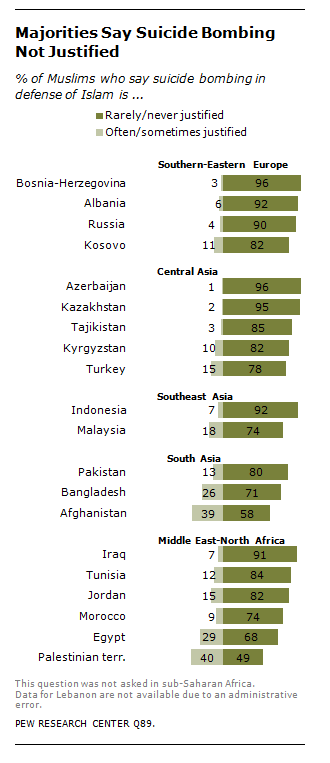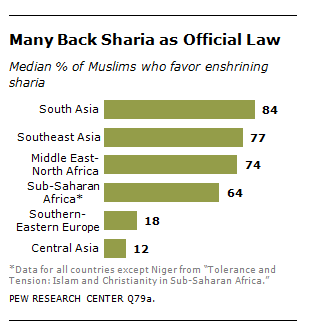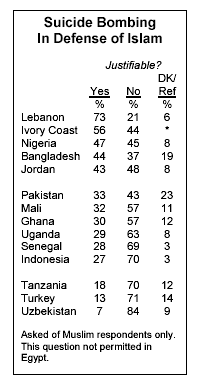
20th November 2015 – Mali – 22 killed – Shooting
13th November 2015 – France – 130 killed – Shooting
12th November 2015 – Lebanon – 37 killed – Bombing
31st October 2015 – Metrojet Flight 9268 – 224 killed – Bombing
10th October 2015 – Turkey – 102 killed – Bombing
26th June 2015 – Tunisia – 38 killed – Shooting
7th January 2015 – France – 12 killed – Shooting
14th April 2014 – Nigeria – 276 kidnapped
15th April 2013 – USA – 5 killed – Bombing
July 2012 – Various – 50 killed – Violent protests in response to a rubbish film that denigrated Muhammad
30th September 2005 – Various – 200 killed – Mass violent protests in response to the publication (in Denmark) of cartoons depicting Muhammad.
N.B. On the 14th February 2015 the responsible cartoonist was allegedly targeted again in the Copenhagen shootings
7th July 2005 – England – 52 killed – Bombing
11th September 2001 – USA – 2977 killed
14th February 1989 – Various – 37 killed – Ayatollah Khomeini (Supreme Leader of Iran) issues a fatwā calling for the assassination of Salman Rushdie having committed the crime of publishing a book that in one section re-narrates the life of Muhammad.
If the left can’t agree on Corbyn then they can certainly agree on these two things:
- Islam is not responsible for any of the aforementioned atrocities
- It is the West’s or the victim’s fault that these bad things have happened
This is not a new response and has in fact been argued for over 20 years. It was Salman Rushdie’s fault that he received a fatwā; he shouldn’t have written a book about Muhammad and insulted 1.6 billion Muslims. Similarly, if you were to keep in touch with the news over the past two weeks you would know that the real reason ISIS exists is because of European Islamophobia/Iraq/Afghanistan/Assad/political instability/economic desperation.
If we can be sure of anything, it is that Islam plays little to no part in the worldwide crisis we have before us. Right?
As Medhi Hasan puts it: “The so-called Islamic State is “Islamic” in the way the British National Party is “British” or the Democratic People’s Republic of North Korea (DPRK) is “democratic” … Why the willingness to believe the hype and rhetoric from the spin doctors and propagandists of ISIS?”
It is common knowledge that anyone who suggests that Islam might be the problem is simply another Islamophobe. Now while this unfortunately tends to be true (see Britain First, Donald Trump etc.), the original proposition that Islam must take some responsibility for ISIS should be entirely uncontroversial. It is clear that this would be a very different war if Islam did not exist, and it is plausible that any strategy focused on critiquing Islam itself could be effective in dissuading potential ISIS recruits.
Now, before I go any further.
Obviously the vast majority of Muslims are not violent. They do not want to destroy the West.
Obviously the demonisation of Muslims and the closure of our borders is not a solution. Most victims of ISIS are Muslims and it would be completely wrong to confuse these victims of terrorism with the perpetrators. It’s despicable how few refugees the UK are helping in this time of international crisis.
However, it is disingenuous for commentators on the left to repeatedly tell us that Islam is not at fault. We can no longer allow ourselves to call this genocidal caliphate ISIS with a silent I.
“How could a terror group like ISIS speak for 1.6 billion Muslims?”

Of course they can’t. By this logic there isn’t really anyone that can speak for all Muslims. But if 0.1% of all Muslims bought into radical Islam then you would have 1.6 million radicals. Note that this doesn’t necessarily mean 1.6 million active terrorists, but 1.6 million Islamists that support more violent literalist interpretations of Islam. 0.1% would still be a significantly concerning number of people that subscribed to dangerous and violent views. My point being that it does not matter that extremist groups do not represent the majority of Islam, if even a small percentage do adhere to extremist views then we all have reason to worry.
Unfortunately, according to an oft-quoted Pew survey (2013), 0.1% could be a gross underestimation. Having surveyed over 38,000 Muslims over 39 countries they found some rather troubling prevalent beliefs.* Here are a couple of points I want to highlight from the report.

While on first glance this graph appears to be reassuring (in the sense that there are only 4 countries where over a quarter of respondents think that suicide bombing is often/sometimes justified) note that 1% can still amount to a lot of people. Also notice that while the title says most Muslims state suicide bombing is not justified, the graph actually tells us that most Muslims think suicide bombing is never/RARELY justified. I believe that is quite different.*

It is important to remember that interpretations of Sharia can be quite varied, but let’s not forget that for some it can include: imprisonment for blasphemy, death for apostasy (leaving Islam), limited legal rights for women, imprisonment for homosexuality, and stoning for adultery. This is not an exhaustive list but should give you a flavour of what Sharia’s about.
There are in fact several countries that currently implement Sharia law.
In Afghanistan, Pakistan and Bangladesh you can be executed for blasphemy.
You can be punished in the UAE for adultery or pre-marital sex with flogging.
In Qatar the punishment for alcohol consumption or ‘illicit’ sexual relations is flogging.
“ISIS are not a religious movement, they are a political movement that uses religion”

The aforementioned examples of the implementation of Sharia law bring me to my next point. It is wrong to say that there is a disconnect between Islam and politics. They are interconnected and influence each other. At the very least Islam is helping to sustain political beliefs and legal systems that we in the West would consider primitive.
There is of course some truth in the complaint that there is something of a disconnect between some of the ISIS recruits and Islam. In fact, MI5 published in a report that many ISIS recruits had little knowledge of the Qur’an and one news story amusingly highlighted a couple of martyrs that saw fit to buy an “Islam for Dummies” book.**
Unfortunately, we are still left with the question of why does using Islam work? For their marketing strategy to be effective we have to assume that there are people out there that respond to their message, which is patently an Islamic message. ISIS are not searching for just anyone to fight for the nations of Syria and Iraq against the oppression of Assad and the West. They are searching for Muslims to fight for Muslims. This is not an issue of nationality, this is a matter of shared belief.
At this point we could consider whether this war is merely a symptom of the in-group versus out-group mentality that we are all born with. For some this condition is manifested by nationalism, for others by football rivalries, for past generations by Marxism, and for this generation of extremists by Islam. This is a powerful argument that is capable of explaining why people from different countries, raised in both the Middle-East and the West rally to a singular call to battle. Superficially, it also somewhat lets Islam off the hook as it suggests we are dealing with a psychological phenomenon that is not particular to Islam. This makes the next point more important. While it may be an eternal sickness of the human race that we feel we need to fight over group differences, it is essential that we find ways to weaken ideologies that lead to widespread violence. And it is much easier to critique the assumptions of Islam than it is Marxism. If you hold the atheist position that there is very little evidence for a god then it becomes much simpler to denigrate any violent ideology that is predicated on this belief.
“They do not preach REAL Islam”

This is exactly what ISIS say about all the good Muslims in the world. This complaint does not solve anything. It is brilliant that most Muslims choose to ignore the more vile sections of the Qur’an, but can we really be so alarmed that some Muslims have chosen to read them literally?
I’m personally a little surprised that everyone doesn’t take their religion literally. If I was told that there was a book in this world that was dictated/inspired by the creator of the universe and ultimate moral authority, and it contained rules I must follow in order to avoid an eternity (I’ll repeat for emphasis…ETERNITY) of pain/fire/boredom. I do not know on what grounds I would ignore any of the injunctions made in this book. But like I said, thank goodness people do!
The Qur’an doesn’t start well to be honest. Page 3 in my Qur’an has this gem:
“As for those that disbelieve, it does not matter if you warn them or not: they will not believe…They will have great torment.” (2:7)
It doesn’t get much better from there!
“God is the enemy of the unbelievers.” (2:98)
“Fighting is obligatory for you , much as you dis-like it . But you may hate a thing although it is good for you , and love a thing although it is bad for you . God knows, but you know not “ (2:216).
“Such are those that are damned by their own sins. They shall drink scalding water and be sternly punished for their unbelief” (6:70).
While I once again wish to re-iterate that most Muslims are peaceful and in no way are represented by these quotes in the Qur’an, it is a bit cheap to claim that Islam is the religion of peace and that it is a complete shock that anyone would find justification for violence in it.
ISIS and Creationism

If I have not convinced you that Islam is responsible for ISIS then allow me to phrase the debate another way. What if we were talking about Creationism?
Creationism is the belief that the universe and all life was created by God, and more specifically that human life began with Adam and Eve. We might not say that every Christian is a Creationist***, but nevertheless we can say that there are enough Creationists in the world spreading their beliefs to cause the science-minded of us to worry. There might be other factors than religion itself that predispose someone to becoming a creationist, for instance the environment that they are raised in. It may even be that they do not really believe but that the view is so prevalent in their community that it would be very socially costly to disavow Creationism. We would not say that biblical literacy is more likely to make you a Creationist, as the majority of Christian scholars do not subscribe to the view of pure Creationism. However, it would be very unusual if we asserted that Creationism had nothing to do with Christianity. That it was a perversion of Christianity. That most people don’t believe in it and that therefore there cannot be any link between the religion and the sincerely held erroneous belief.
It would be utterly bizarre if we didn’t at least consider the possibility that the way to stop the spread of Creationism was to critique Christianity itself.
The truth is that this is all very complicated. There isn’t one reason that people join ISIS and similar death cults.
Western warmongering played its part, economic instability may play its part****, Assad’s and Saddam’s sectarian genocidal dictatorship has undoubtedly played a massive part, but we are not being honest unless we admit that Islam has also played its role in the formation and sustaining of Islamic State.
We cannot deal with this crisis competently until we have an honest discussion about what makes this war so attractive to ISIS recruits. That discussion must involve the role of Islam and such a conversation would surely conclude that these militants are not fighting for Iraq, they are not fighting for Syria, they are fighting for Islam.
“We are not killers. We are defenders of the prophet, we don’t kill women. We kill no one. We defend the prophet. If someone offends the prophet then there is no problem, we can kill him. We don’t kill women. We are not like you. You are the ones killing women and children in Syria, Iraq and Afghanistan. This isn’t us. We have an honour code in Islam.”
Cherif Kouachi (Charlie Hebdo massacre)
“I and thousands like me are forsaking everything for what we believe. Our drive and motivation doesn’t come from tangible commodities that this world has to offer. Our religion is Islam, obedience to the one true God and following the footsteps of the final prophet messenger. Your democratically-elected governments continuously perpetuate atrocities against my people all over the world. And your support of them makes you directly responsible, just as I am directly responsible for protecting and avenging my Muslim brothers and sisters. Until we feel security you will be our targets and until you stop the bombing, gassing, imprisonment and torture of my people we will not stop this fight. We are at war and I am a soldier. Now you too will taste the reality of this situation.”
Mohammad Sidique Khan (7/7 bomber)
“It has become clear that the West in general and America in particular have an unspeakable hatred for Islam….It is the hatred of crusaders. Terrorism against America deserves to be praised because it was a response to injustice, aimed at forcing America to stop its support for Israel, which kills our people…We say that the end of the United States is imminent, whether Bin Laden or his followers are alive or dead, for the awakening of the Muslim umma (nation) has occurred”
Osama Bin Laden
* I’ve actually picked a Pew survey that is relatively favourable towards Muslims. Another Pew survey (2002) found much bleaker results.

The worst thing about this survey is that once again ‘No’ includes rarely justified. Taking Jordan as an example, if rarely justified was counted as ‘Yes’ then the line of percentages would read: 65 26 8.
I encourage everyone to read the full Pew report (2013) as it contains a lot of interesting information about modern Muslims. It’s not all doom and gloom, the report found that the majority of Muslims don’t think there is a tension between devout and non-devout Muslims; few Muslims believe that their faith is incompatible with modern society and science; there is also widespread support for democracy. My point in selecting the two examples I did was to suggest that there is clearly a strong link between classical Islamic beliefs and the modern Muslim’s belief in Sharia and (to a lesser extent) martyrdom.
** Though should we assume that increased academic knowledge of Islam relates to more sincere belief?
*** I mean this in the purest sense as presumably every Christian is a Creationist to some extent.
**** Sam Harris points out that Ahmed Omar Sheikh (who organised the kidnapping and murder of Daniel Pearl) studied at London School of Economics, Hezbollah operatives that die in violent operations are less likely to be from a poor background and more likely to be educated to a secondary school level, and the leaders of Hamas are all college graduates. Therefore suggesting that belief is a more powerful motivator than socio-economic background. Though this should be clear to us by now as militants are being recruited to ISIS from all over the world.



